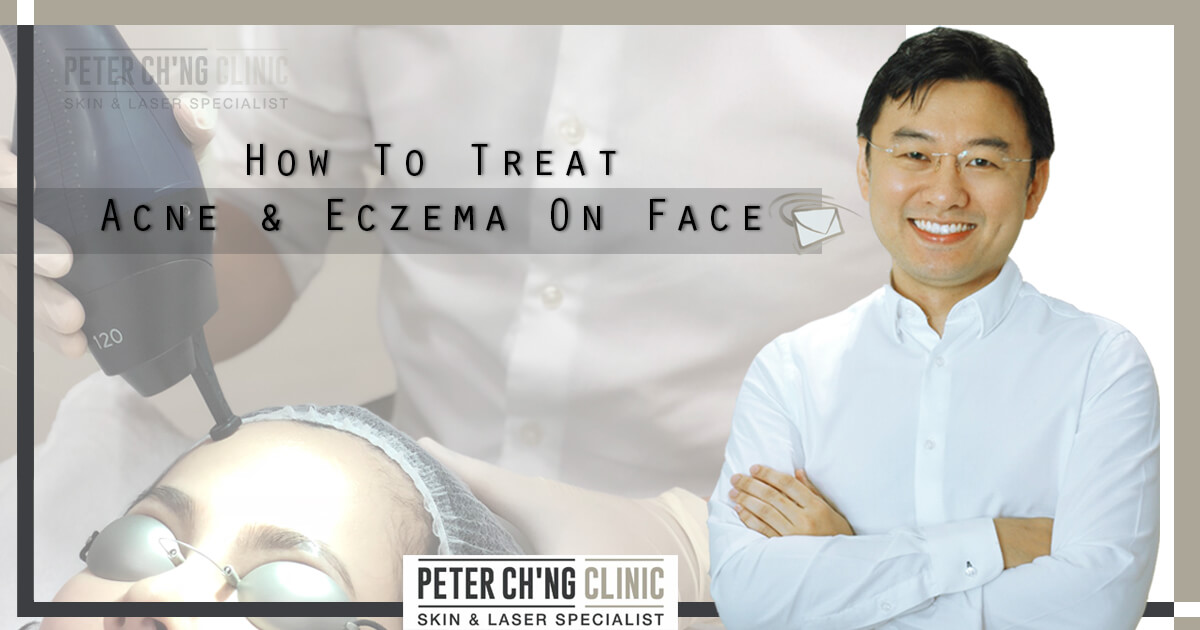Patient Mailbox: Acne and Eczema on Face

Hi! I’m Dr Peter.
Here's Episode 28 of the Patient Mailbox series, where we collect handpicked questions submitted by patients suffering from various skin diseases and condition, and personally answer them with our best efforts. I hope to help any one of you who faces challenges from similar situations.
Editor’s Note: Dr Peter Ch’ng is a Consultant Dermatologist actively involved in numerous talks and workshops, and is an esteemed contributor to dermatology research and publication internationally. He practices at both Peter Ch'ng Clinic Skin & Laser Specialist in Desa Park City and Gleneagles Hospital Kuala Lumpur.
Question:
Dr Peter,
I’m Lilian. I have been suffering from facial eczema for years.
I used be a waiter at my family’s restaurant, but thanks to all the unkind whispers I am now working in the kitchen instead. It seems like my eczema has worsened since I started working in the kitchen. Could it be that my working environment is causing that? I started getting pimples and pus bumps on my face... Is that a part of my eczema? Or is it acne? Could you please explain the difference between acne and eczema?
Throughout the years I have tried various ways to cure my eczema. I have tried many skincare products, including all sorts of creams and facial masks, but none of those worked, some even make it worse… Can eczema actually be treated? Or is there anything I can do to improve my skin condition?
Also, is there any way to get rid of the eczema scars on my face? I have these scars and dark patches on my face that just won’t go away. :(
Thanks in advance!
Answer:
Hi Lilian,
I can truly understand that being an eczema sufferer, battling has never been easy when the rashes tend to flare, go away, and then come back again. Let’s start off by distinguishing between acne and eczema before we go any further on what we can do in your case.
Acne vs. Eczema
Acne is a skin condition that affects only the pilosebaceous unit – the structure consisting hair follicle and sebaceous gland (oil secreting gland) – and the skin closely around it. Acne is caused by clogging of hair follicles and an overactive of sebaceous glands, which cause oily skin. The C. acnes (Cutibacterium acnes) bacteria in the hair follicles multiply, releasing substances that cause irritation and redness. Those follicles then rupture and spill the contents into the surrounding skin, which eventually cause inflammation.
Eczema, on the other hand, is the inflammation of the skin resulting from interactions between environmental and genetic factors. There are various types of eczema, but they are generally characterized by dry skin, itchiness, red patches and/or scaly patches. A common misconception is that eczema is contagious. Eczema is not contagious.
Unlike acne, eczema can affect any part of the body, even skin without hair follicle and sebaceous gland. For babies, eczema tends to affect their cheeks. For toddlers, eczema is more likely to affect their elbows and knees. For those who sweat a lot, eczema tends to affect their groin and armpit areas.
While acne and eczema are two totally different skin conditions, they can co-exist. In your case, it is very possible that you have both. And yes, working in a greasy kitchen may very well be contributing to the worsening of your condition.

Treatments for Eczema
Using moisturizing cleanser followed by moisturizer should help improve the condition. To prevent recurrence, apply mild topical steroid followed by non-steroidal anti-inflammatory cream. Antihistamine can also be used to reduce itchiness.
Important: Do not use strong topical steroids on your face. Using strong topical steroids may result in permanent thinning of the skin. It is advisable that you consult a certified medical doctor for advice on topical products suitable for your skin condition.
Treating skins affected by both eczema and acne is much trickier. It depends a lot on the exact condition of the skin. For inflammatory acne, steroid injection may be needed. Laser treatment may also be used. If the condition of eczema is very severe, it needs to be treated first before the acne problems can be addressed.

About Skincare and Cosmetic Products
Since you are suffering from both eczema and acne, it is quite understandable that you would find skincare products not helpful, or even harmful to your condition. While moisturizing products will most likely help with your eczema, too much moisturizing may cause your hair follicles to clog up, leading to acne problems. This is especially true with facial skin as it has a lot of pilosebaceous units. Hence, it is important not to over-moisturize your face.
Also, some skincare products may trigger eczema. I recommend that you stop using random skincare products for now, as you never know which product will further aggravate the condition of your eczema. In general, you should try to avoid anything that may trigger eczema, including cosmetic and beauty products. You may slowly reintroduce them to your skin once you have recovered from eczema, and that your skin barrier has successfully rebuilt itself.

Eczema Scars?
Actually, eczema itself does not cause scarring. The scars are most likely caused by scratching or possibly secondary bacterial infection. While itching is the signature characteristic of eczema, in order to prevent scarring, you should do your best to refrain from scratching affected skin.
There are various methods of removing scars and skin discoloration (dark patches). I recommend laser treatment. Keep in mind however that laser treatments should only be performed by certified medical doctors and professionals.

Eczema is a chronic disease. It takes time to treat, and may stubbornly reoccur even after you think you have gotten rid of it. My best advice is to be patient and never give up. Stay positive!
Hope this helps.
Look out for next week’s entry as we look at few ways to get relief from eczema. Stay tuned!

If you’d like to ask more about your skin condition or have a discussion with Dr Peter, you can contact us at +6011-22882299, Whatsapp us, or book an appointment with Dr Peter here!
Treatments mentioned in this article :
Laser Treatments for Acne and Acne Scars
Laser treatments can reduce inflammation, as the laser light is absorbed by the haemoglobin (our red blood cells), and is useful for treating inflammatory acne.
